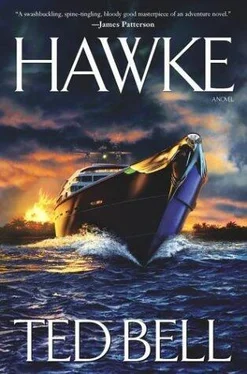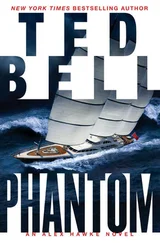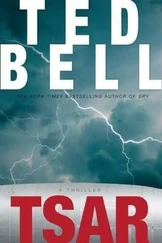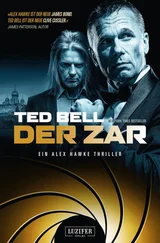“A little dicey getting in, I’ll admit, but those sharks are harmless. Besides, look around you, Ambrose! Rather surreal, wouldn’t you say?” The resounding echo of Hawke’s voice added to the magical quality of the grotto.
Congreve ignored him, looking around for the damnable Russians who’d been swimming right behind him. Terrified they might have panicked and, worse yet, that Hawke might ask him to go get them, he was thrilled to see first one, then the other, pop to the surface. Coughing and sputtering, they removed their masks and didn’t bother to try to conceal the terror that was plain on their faces.
The bearded bear shouted one word over and over to Congreve and made a jerking gesture with his hand.
“What does that word mean, Ambrose?”
“Sharks, sharks, sharks,” Congreve translated. “They are extremely unhappy about your choice of venue, absolutely petrified of sharks, and would like to leave immediately. I must say I have a lot of sympathy for their position.”
“Sorry. It’s here or nowhere.”
Congreve translated and, after a rancorous exchange, the Russians seemed to resign themselves to their fate. The four swimmers formed up into a circle, paddling to stay in place.
“I’ll be brief,” Hawke said. “I am interested in making a purchase. Extremely interested.”
The translation brought smiles back to the faces of the Russians. They spoke rapidly to Congreve.
“They will be happy to oblige you,” Congreve said. “The hovercrafts are reasonably priced. Only sold in lots of three. Two million pounds each. Guaranteed delivery in eight weeks.”
“No, no. No bloody hovercraft,” Hawke said.
Congreve gave him a puzzled look. “What then?”
“Tell them I want to buy a ‘boomer.’ A Soviet Akula-class submarine.”
A nuclear submarine? But Congreve didn’t even blink. He’d been with Hawke too long. He told the Russians what Hawke had said. Both men bobbed their heads excitedly.
“I assume that’s a yes,” Hawke said. “How much and how long until I get it?”
The exchange was brief. Congreve said, “They have an Akula. Excellent condition. One of the last to be built. Fifty million dollars, half up front, the other half payable upon delivery. Six months to get the vessel seaworthy and assemble a trained crew and shoreside maintenance team.”
Hawke eyed the Russians evenly. “How old?” he asked.
Congreve asked and said, “One of the last Soviet subs produced. The Akula Typhoon. Built in 1995.”
“No, no,” Hawke said. “No Typhoon. I want the very last series they built. The Akula II. Code name Borzoi.”
Congreve told them and it generated a lot of head-shaking protestation by the Russians. Ambrose finally said, “They don’t know anything about a Borzoi.”
“My information says they’re lying. Tell them I want a Borzoi. I’m prepared to pay a considerable sum of money. And I want to speak directly to the last person to purchase one. For this kind of money, the emptor better damn well caveat.”
Upon hearing this wrinkle, the bobbing heads of the Russians conferred with each other. Rasputin clearly wanted to proceed; the other one did not. He’d been expecting this to be the hard part. It was why he’d chosen this location to negotiate.
“You’ll notice,” Hawke said, “that the tide has been rising. Very shortly we will be banging our heads on those nasty-looking coral stalactites up there. Some are poisonous. After that, we run out of air. Also, notice how rapidly the sun’s angle through the blowhole is changing. It will be almost completely dark inside soon. Even now there’s not enough light to swim out without getting yourself chopped up by the poisonous coral. Unless, like me, you have one of these dive lights.”
Hawke switched on the high-powered light mounted above his dive mask and directed it toward the Russians, who grimaced in the glare and turned away.
“The experimental Akula II,” Hawke said. “Borzoi. Twin-hulled sub shaped like a boomerang. Carries forty warheads. Tell them that’s the only boat I’m interested in.”
Congreve translated after a brief parley and said, “They say they don’t know anything about a second-generation Akula. They say the Akula I was the last sub produced before the collapse of the Soviet Navy.”
“Fine,” Hawke said. He switched off the light and plunged them all into shadowy darkness. “We’ll all just bob around in here until their memory improves or they drown. Whichever comes first.”
Thirty seconds later there was a sharp cry of pain. The surging tide had smashed one of the Russians up against the jagged stalactites that formed the grotto’s ceiling. Hawke switched on the light and aimed it at the Russians. The skinny little one had a bloody gash over his right eye.
“I want a Borzoi, comrade,” Hawke said, swimming up to him and getting right in his facemask. “Nothing else. Is that clear? Borzoi.”
The Russian sputtered something, shaking his head and peering into Hawke’s mask.
“What’s he say?” Hawke asked Congreve.
“He says yes.”
“Pithy,” Hawke said, smiling behind his mask.
“He says, yes, it’s possible he may be able to locate a Borzoi for you. The price will be very high, however.”
“Good,” Hawke said, smiling at Congreve. “I thought they’d rise to the occasion. Tell them we’ll talk money over dinner aboard Blackhawke. The launch will pick them up at the dock. Seven sharp. Dinner at eight.”
Hawke dove and kicked down, his powerful beam catching the brilliant fish and multicolored coral and lighting the way out of Thunderball. He wasn’t surprised to find his little flock paddling right behind him.
Colonel Manso de Herreras sat on the unshaded platform next to the empty chair of his closest friend, the Maximum Leader. Fidel Castro. The Cuban caudillo.
Manso was sweating profusely. His uniform was drenched. Perspiration burned his eyes. It wasn’t the heat that was bothering him, though. It was the chain of events he planned to unleash when and if this never-ending ceremony was concluded. The last Communist leader in the Western Hemisphere had already been speaking for well over an hour.
The platform where Manso sat baking beside the empty chair was on the white marble terrace of the old Habana Yacht Club. They were in one of the old neighborhoods, only a few blocks from the leader’s primary residence. Still, there were six big black Mercedes parked in the circular drive. The leader never rode in the same car twice. Never slept in the same house two nights in a row.
Manso had been sitting in the sun on the flimsy folding chair for almost two hours now. He’d turned a deaf ear to the ceremony and passed the time gazing out over the drowsy harbor. There were a few fishing trawlers crisscrossing the mirrorlike sea. He’d followed their passages idly, trying to tune out the papery voice at the lectern.
It was a dedication ceremony of some kind, God knows what. It was easily the third one he’d attended this week. He no longer bothered to find out who or what they were honoring at these events. They were constantly honoring or dedicating something or other lately, he’d noticed. It hardly seemed to matter what it was.
They would dedicate a tractor if they could find one that was running, he thought, scanning the crowd for any pretty seсoritas. He had come to believe that el jefe either enjoyed being handed wilted carnations by endless processions of schoolgirls or was convinced such festivities took the people’s minds off some of their more immediate problems.
Like eating.
An American joke had circulated recently amongst the higher echelons of the Cuban military and State Security. The joke had it that Castro had gotten everything right in Cuba but three little things. Breakfast. Lunch. And dinner.
Читать дальше












